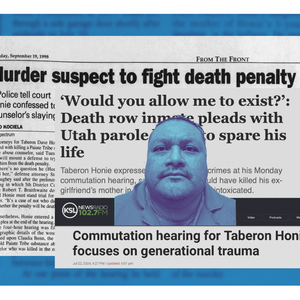
To rein in the social and economic costs caused by the overly aggressive use of the death penalty by prosecutors, a California legal scholar is proposing a plan he believes will reduce miscarriages of justice and increase prosecutorial accountability.
In Shrinking the Accountability Deficit in Capital Charging, a new chapter in the 2020 Oxford Handbook of Prosecutors and Prosecution, UCLA law professor Sherod Thaxton (pictured) argues that to temper the unfettered discretion local prosecutors now enjoy in capital charging decisions, states should establish advisory boards to issue opinions on whether the death penalty should be pursued in a particular case. If the prosecutor decides to seek death despite an adverse advisory recommendation, Thaxton proposes shifting the financial costs associated with the case to the local jurisdiction as a means to hold prosecutors financially accountable for their decisions.
Professor Thaxton begins his analysis by noting that the high statewide costs of capital punishment are driven disproportionally by overly aggressive use of the death penalty by a small number of outlier jurisdictions, despite “sharp criticism from both legal analysts and officials in every branch of government.” These outlier jurisdictions, he says, contribute to most of the death sentences and executions in the country, but also have higher rates of error and contribute to higher costs for the administration of justice. In addition, Thaxton says, the overpursuit of the death penalty “may increase crime, decrease the likelihood of arrests for homicides, and lead to heightened risks of miscarriages of justice for non‐capital defendants.”
Given the outsized impact of these outlier jurisdictions, Thaxton argues, “[d]iscouraging the overly aggressive use of the death penalty by prosecutors may be the most effective (and efficient) way to reduce the overall prevalence of error in capital charging-and-sentencing systems, as well as unnecessary expense.”
Thaxton notes that the practices of these jurisdictions are out of step with the views of the broader community that is forced to absorb the costs. Public support for capital punishment is at its lowest point in recent history, he writes, “influenced, in part, by a voluminous scholarly literature that consistently reveals not only rampant arbitrariness and capriciousness (i.e., the death penalty is not reserved for the ‘worst-of-the-worst’ as the U.S. Constitution requires), but also racial/ethnic, gender, and geographic bias in capital charging, sentencing, and reversals on appeal.”
Thaxton proposes “a relatively modest reform that may be especially effective in shifting some of the financial and administrative costs of inadequate charge screening, while still allowing prosecutors to retain discretion in seeking the death penalty.” A reviewing body would provide an advisory opinion for cases in which the prosecutor wishes to seek a death sentence. If the screening committee advises against a capital prosecution, the local jurisdiction would be responsible to pay an increased percentage of court costs if the case is later resolved by plea or if the case is reversed at a later stage. If a plea deal is reached later in the process, the local jurisdiction would be responsible for paying a larger percentage of pre-trial and trial costs. If a death penalty is sought and obtained after a negative recommendation, the local jurisdiction would pay a percentage of appellate court costs if the conviction or sentence is reversed.
Thaxton’s proposal also would require trial prosecutors to participate in the appeals of the case. He argues that such participation is crucial because it is currently “politically profitable for prosecutors to (over)produce death sentences because they benefit from death sentences and do not have to internalize the costs of these legal errors, irrespective of whether those convictions are obtained while violating the statutory and constitutional rights of defendants.” He seeks to have trial prosecutors internalize the cost of rights violations by “[i]dentifying prosecutors, by name, whose mistakes cause reversals and requiring them to appear in the brief and in court as counsel of record in all appellate proceedings.”
Sherod Thaxton, Shrinking the Accountability Deficit in Capital Charging in the Oxford Handbook of Prosecutors and Prosecution, Ronald F. Wright, Kay L. Levine & Russell Gold, eds., Oxford University Press (2020).
Costs
Sep 11, 2024
